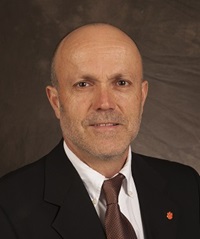Antonis Katsiyannis, Ed.D. '89 named President of CEC
 Antonis Katsiyannis, Ed.D. '89 and the Alumni Distinguished Professor of Special Education at Clemson University, recently began his term as president of the Council for Exceptional Children (CEC).
Antonis Katsiyannis, Ed.D. '89 and the Alumni Distinguished Professor of Special Education at Clemson University, recently began his term as president of the Council for Exceptional Children (CEC).
In addition to being a member of the CEC Board of Directors, Katsiyannis serves on several editorial boards and as the co-editor of the Journal of Disability Policy Studies. He also is actively involved in the field of behavioral disorders by having served as the president of CEC’s special interest division, the Council for Children with Behavioral Disorders (CCBD), and as a board member of the Midwest Symposium for Leadership in Behavior Disorders.
In this Quick Q&A, CEC's new president shares his thoughts on his plans for the year ahead.
How did you first get involved in special education?
Through my field based experiences in college as an elementary education major. I had the opportunity to work with an amazing special education teacher. Though I was at first apprehensive given my limited experience with students with disabilities, I was impressed with the skill development among the students and their steady progress in becoming independent. I also recall my experiences in a center-based program in Hampton City Schools (VA), where the teacher was so engaging that all her students were breaking all expectations in developing functional skills.
How did you first get involved with CEC?
I have been a member since 1987 when I was still in graduate school. I was thrilled to go to my first CEC conference in Chicago with my fellow classmates and interact with so many amazing teachers and the authors of books I was reading in my classes.
Describe your path to leadership in CEC?
I have been very involved with CCBD and the Midwest Symposium for Leadership in Behavior Disorders, where I had the opportunity to interact and be inspired by leaders in the field (e.g., Simpson, Wood, Kauffman, Nelson, Forness, Epstein, Peterson, Smith, Lewis, Maag, Conroy, Bradley, Lane, Wehby, Yell…and many others). These interactions shaped my interest in being involved in professional organizations to better serve students with emotional and behavioral disorders. I also served as the South Carolina CCBD president, as well as the president of CCBD, before joining the CEC Board of Directors.
How will your role as a teacher educator inform your leadership of CEC?
I have had the opportunity to work with extraordinarily bright students who are eager to learn and apply evidence-based instructional and behavioral interventions, and stay abreast of current developments (e.g., legal and policy issues) in special education. I also have been very active in contributing to the professional literature, particularly legal and policy issues, students with emotional and behavioral disorders, and delinquency. These responsibilities as a university professor have provided me with a rich perspective on trends and issues in special education and the critical role our dedicated professionals play in maximizing the learning outcomes for students with disabilities.
What are you hoping to accomplish during your year as president?
My goals are to provide increased opportunities for engagement of our members (e.g., expand opportunities for professional development), to position CEC to be a powerful voice in advocacy activities (e.g., upcoming IDEA reauthorization), ensure that CEC is working and is responsive to the needs of our divisions (e.g., technical support, open/continuous communication), and to ensure a fiscally secure Council.
Katsiyannis can be reached at president@cec.sped.org.